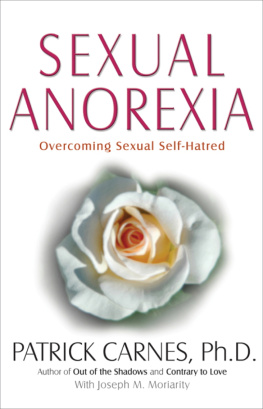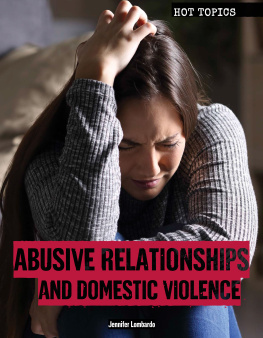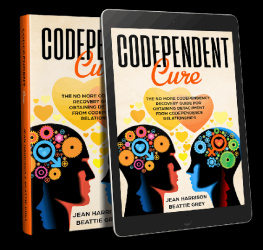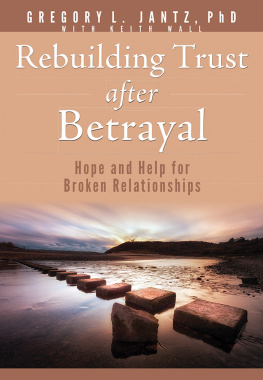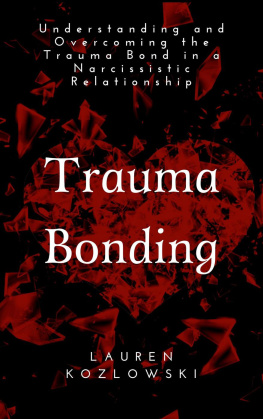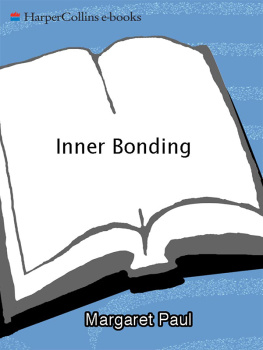The
Betrayal
Bond
Breaking Free
of Exploitive Relationships
Patrick J. Carnes, Ph.D.

Health Communications, Inc.
Deerfield Beach, Florida
www.hcibooks.com
Taint Nobodys Biz-ness If I Do
Words and Music by Porter Grainger and Everett Robbins
1922, 1949, 1960 by MCA MUSIC PUBLISHING, A Division of
UNIVERSAL STUDIOS INC.
Copyright renewed
International Copyright Secured
All Rights Reserved
Library of Congress Cataloging-in-Publication Data
Carnes, Patrick, date.
The betrayal bond : breaking free of exploitive relationships / Patrick J. Carnes.
p. cm.
Includes bibliographical references.
ISBN-13: 978-1-55874-526-1 (trade paper)
ISBN-10: 1-55874-526-2 (trade paper)
1. Relationship addiction. 2. BetrayalPsychological aspects.
3. Psychological abuse. 4. ExploitationPsychological aspects.
5. VictimsPsychology. I. Title.
RC552.R44C37 1997
1997 Patrick J. Carnes
All rights reserved. Printed in the United States of America. No part of this publication may be reproduced, stored in a retrieval system or transmitted in any form or by any means, electronic, mechanical, photocopying, recording, or otherwise without the written permission of the publisher.
HCI, its logos and marks are trademarks of Health Communications, Inc.
Publisher: Health Communications, Inc.
3201 S.W. 15th Street
Deerfield Beach, Florida 33442-8190
R-06-07
This book is dedicated to
Howard Williams and Norman Sprinthall.
I carry their voices with me.
For information on therapists in your local area, please call 800-632-3697. For information on workshops, conferences and retreats with Dr. Carnes, please call 800-621-4062, or write The Meadows, 1655 N. Tegner St., Wickenburg, AZ 85390. For information on audio- and videotapes as well as other publications by Dr. Carnes, call 800-955-9853, or write New Freedom Publications, P.O. Box 3345, Wickenburg, AZ 85358.
Contents
Figures
Acknowledgments
There are many to thank. Pat Mellody, Pia Mellody and the entire Meadows staff, for their continuous support for my writing and research. I especially wish to thank Maureen Canning, Ray Early, Elizabeth Ewins, Peter Vincent and Lynda Grange. As primary counselors they helped hone the exercises used in this book. Without Kathy Kelleys support and office skills, this manuscript may have never become manageable. As always, Linda Holman Bentley and the staff of the Phoenix Public Library helped immensely. I relied on two experts, Nancy Hopkins and Jennifer Schneider, M.D., whose careful reading of the manuscript helped fill the gaps.
The Health Communications staff experienced a delay in the publishing process because of my transition to The Meadows. They were gracious and understanding in spite of the problems the delay caused. I appreciate the hard work of Bill Chickering, Matthew Diener and Christine Belleris in shaping and editing the manuscript. I will forever be indebted to Gary Seidler, for he has encouraged my writing, my speaking and my professional work. I am grateful for his faith in me.
I have a group of friends who watched over the birth of this book. Known as the Woman Lake Gang, they are Ann and Fred Foresman, Phyllis and Lennie Brooks, Skip and Sandy Reiter, and Leslie Myers. Their care meant a lot. My wife, Suzanne, walked every step of the way in the making of this book. It is a lucky man who has a wise woman for a spouse.
Finally, I wish to thank the people whose stories appear in these pages. My hope is that their voices become like a chorus for a new understanding of betrayal.
How This Book
Came to Be
This book started in 1974. I was in graduate school and I was in love. There was one problem, however. The woman I was in love with was compulsive sexually, acting out with other men. I was putting her through school and trying to be understanding about her behavior. I was totally crazy with the relationship. We went through cycles of agony; Id discover her behavior, there would be forgiveness and a passionate reconciliation, then Id make another discovery and the cycle would begin all over again.
I was working on my doctorate. I had two wonderful advisors in Howard Williams and Norman Sprinthall. The gifts they gave me in my life are uncountable, but none was more important than the day they sat me down and expressed concern about my relationship. I was just on the verge of another passionate reconciliation. Norman Sprinthall looked at me and said, You remind me of Charlie Brown and Lucy Van Pelt with the football. He was referring to Lucys constant effort to get Charlie Brown to kick the football, which she always jerked away at the last minute. I immediately got the point. Then he added, There is a cure for this, you know. Pausing for emphasis, he concluded: No more football! As far as my personal growth was concerned, it was the most important thing said to me in graduate school.
That conversation opened the door to understanding a part of myself that took a couple of decades to appreciate fully. If it is like other periods of growth in my life, there is more learning still to come. Over time I learned that I bonded with people who were very hurtful to me and remained loyal to them despite betrayal and exploitation. This pattern of insane loyalty affected my professional and business relationships, my friendships, my finances and my intimate relationships. In my counseling work I saw my pattern of behavior repeated in others. In my research I documented how that happened for people. Gradually a map emerged for me about what the problem was and how to survive and eventually overcome it.
The problem is called betrayal bonding. Betrayal intensifies pathologically the human trait of bonding deeply in the presence of danger or fear. Writing a book about it became a challenge. First, professionals who work with trauma or post traumatic stress found very similar things to what addiction professionals found. Yet both fields were largely unaware of the other. Even worse, they used different language to describe what they knew. Within the trauma field there were those who worked with object relations that expanded our understanding of how traumatized persons operated out of a damaged relationship template. Yet their insights were outside of mainstream trauma research. Addiction professionals were also seeing compulsive relationships that had all the characteristics of addictive disorders. These relationships, however, were so enmeshed in addictions and compulsive behaviors that they would get lost in the general consequences of the addictions themselves. Professionals knew that there was often a traumatic history in all addictions but were unclear about how that affected these compulsive relationships.
Finally, family and marriage researchers offered an extremely helpful understanding of the systems operating in these relationships. The challenge was how to integrate all of that complex insight into a map most people could understand. Professionals will find a conceptual audit trail in the notes and in the bibliography at the end.
The other part of my motivation to write this book came out of a six-year research project that followed over 1,000 recovering sex addicts and their families. The results of that work were published in a book called Dont Call It Love. In that book I reported the stages that trauma victims went through in developing the consciousness to change their lives. As researchers we found it very laborious, tedious work, but the learning was important in that it increased the level of understanding for all those who have experienced betrayal. It is core to this book.


